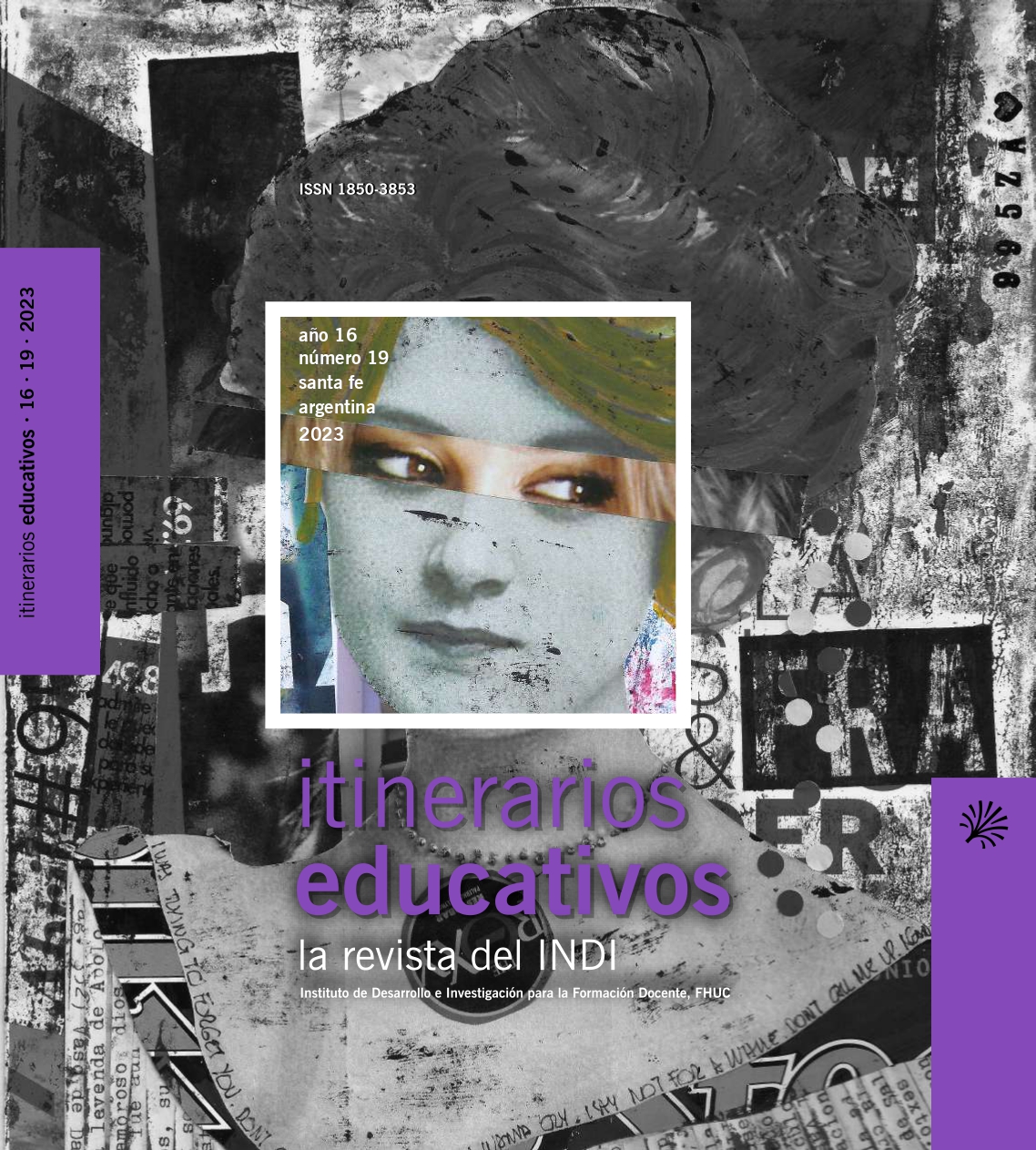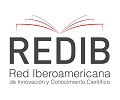El registro imaginario como organizador del posicionamiento subjetivo en formadoras de formadores
DOI:
https://doi.org/10.14409/ie.2023.19.e0057Palabras clave:
formación de formadores, posicionamiento subjetivo, registro imaginario, toma de decisionesResumen
El posicionamiento subjetivo designa la forma en que un sujeto habita una posición establecida o construye una nueva, desde la cual interpreta cualquier fenómeno. En un aula constituye la base sobre la cual se toman las decisiones pedagógicas. En este trabajo buscamos caracterizar el posicionamiento subjetivo de dos formadoras de formadores en un dispositivo de formación enfocado en la reflexión sobre las prácticas realizado en Buenos Aires. Aplicamos análisis de contenido (Krippendorf, 1990) a siete reuniones de supervisión y una entrevista a las dos formadoras. El análisis permitió elaborar cuatro hipótesis. 1– Es posible identificar seis dimensiones que configuran el posicionamiento subjetivo de un formador —la dimensión vincular, la del sentido de la formación, la de los fundamentos conceptuales, la de los valores, la de los afectos y la de la lectura de la situación presente. 2– La última funciona como eje organizador de las otras. 3– En ella participa de manera preponderante el registro imaginario, que organiza las otras dimensiones. 4– Los posicionamientos de ambas formadoras pueden ser considerados como exponentes de dos imaginarios sociales en torno a la formación actualmente en tensión: el de la formación como proceso de comprensión racional de situaciones y el de la formación como elaboración psíquica.
Citas
Alliaud, A. & Antelo. J. (2009). Iniciarse a la docencia. Los gajes del oficio de enseñar. Profesorado: Revista de curriculum y formación del profesorado 13(1), 90–100. Recuperado de: https://revistaseug.ugr.es/index.php/profesorado/article/view/20579
Ardoino, J. (2005). Complejidad y formación. Pensar la educación desde una mirada epistemológica. Buenos Aires: FFyL– Noveduc.
Barbier, J. M. (1999). Prácticas de formación. Evaluación y análisis. En Formación de formadores. Serie los documentos 9. Buenos Aires: FFyL.
Beillerot, J. (1996). La formación de formadores. Serie los documentos. Buenos Aires: FFyL–UBA. Ediciones Novedades Educativas.
Castoriadis, C. (1989). La institución imaginaria de la sociedad. Vol 2. Barcelona: TusQuests.
Cifali, M. (2018). S'engager pour accompagner. Valeurs des métiers de la formation. Paris: PUF.
Doyle, W. (1983). Academic Work. Review of Educational Research, 53(2), 159–199.
Filloux, J. C. (2001). Campo pedagógico y psicoanálisis. Buenos Aires: Nueva Visión.
Freud. S. (1915). Obras completas. Vol V. Lo inconsciente y la conciencia. La realidad. Buenos Aires: Amorrortu.
Guevara, J. (2017). Divergencias en la definición del oficio docente en el espacio de las prácticas. Un estudio de caso sobre el nivel inicial. Revista Páginas de Educación 10(2), 1–20. Recuperado de: https://doi.org/10.22235/pe.v10i2.1418
Krippendorf, K. (1990). Métodología de análisis de contenido: Teoría y Práctica. Buenos Aires: Paidós.
Lacan, J. (2009). Escritos. México: Siglo XXI.
Manrique, M. S. (2023). La coordinación y la transferencia en un dispositivo clínico de formación de formadores. Revista del instituto de investigaciones en educación (RIIE) Universidad Nacional del Nordeste, 19(14), 64–83.
Manrique, M. S. (en prensa). Incomodidad y procesos de subjetivación en la Formación de formadores. Cuadernos de Pesquisa.
Mazza, D. (2016). La tarea en la Universidad. Cuatro Estudios Clínicos. Buenos Aires: EUDEBA.
Mevorach, M. & Strauss, S. (2012). Teacher Educators' In–Action Mental Models in Different Teaching Situations. Teachers and Teaching: theory and practice, 18(1), 25–41. Recuperado de: https://doi.org/10.1080/13540602.2011.622551
Morin, E. (1996). Introducción al pensamiento complejo. Barcelona: Gedisa.
Morin, E.; Roger Ciurana, E.; Motta, R.D. (2006). Educar en la era planetaria. Barcelona: Gedisa.
Pujade–Renaud, C. (1983). Le corps de l´éléve dans la classe. Paris: ESF.
Rabinovich, D. (2007). Modos Logicos Del Amor De Transferencia. Buenos Aires: Manantial.
Souto, M. (2010). La investigación clínica en Ciencias de la Educación. Revista del IICE, Año XVII, 29, 57–74.
Sennet, R. (2009). El artesano. Barcelona: Anagrama.
Zeichner, K. M. (1994). Research on teacher thinking and different views of reflective practice in teaching and teacher education. En I. Carlgren, G. Nadal, S. Vaage (Eds.), Teachers´minds and actions: Research on teachers´ Thinking and Practice (pp.9–27). London: Falmer Press.
Publicado
Cómo citar
Número
Sección
Licencia
Aviso de derechos de autor/a
Los autores que publican en esta revista están de acuerdo con los siguientes términos:
- Los autores conservan los derechos de autor y garantizan a la revista el derecho de ser la primera publicación del trabajo al igual que licenciado bajo una Creative Commons Attribution License que permite a otros compartir el trabajo con un reconocimiento de la autoría del trabajo y la publicación inicial en esta revista.
- Los autores pueden establecer por separado acuerdos adicionales para la distribución no exclusiva de la versión de la obra publicada en la revista (por ejemplo, situarlo en un repositorio institucional o publicarlo en un libro), con un reconocimiento de su publicación inicial en esta revista.
- Se permite y se anima a los autores a difundir sus trabajos electrónicamente (por ejemplo, en repositorios institucionales o en su propio sitio web) antes y durante el proceso de envío, ya que puede dar lugar a intercambios productivos, así como a una citación más temprana y mayor de los trabajos publicados (Véase The Effect of Open Access).












